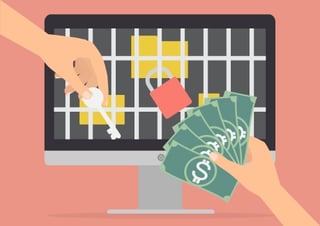2 min read
What Just Happened?! Ransomware, Security, and Basic Cyber Hygiene
Voicebrook Monday May 15, 2017


- Contact your IT Department immediately. They are your first line of defense.
- Do NOT turn off or unplug your computer. Just leave it alone and walk away - if you turn it off or try to click out of it, you might make things worse and can actually hinder authorities from tracking the virus and removing it from your computer.
- Do NOT click any links to “pay the ransom/fee.” These links could download even more malware to your computer.
The attack in the news is very sophisticated, so don't fret if you became a victim. Just stay calm and let the authorities handle it. If you are unsure if you have become a victim of the ransomware attack, ask your IT Department. If your home computer is attacked, follow the same steps, but contact authorities instead of your IT department. Local police may not be equipped to deal with ransomware attacks, but your local FBI branch will. To find the contact information for the FBI field office that serves your area, you can visit their site here.
Prevent Future Attacks
It's easy to overlook the very real threats from cyber attacks. Even the most basic steps to avoid them can seem like too much work, but they are crucial to avoid becoming a victim. Think of it as "cyber hygiene." You take steps in your day to day life to keep viruses out of your body; here are some steps you can take to keep them out of your computer.
- Never download email attachments from unknown senders or sources. If you’re unsure, call the person who sent it and verify that it came from them
- Don’t click links from unknown sources - either in email or on the Internet. Pop-up Ads, banners, and flashing memes are notorious for having malicious content.
- Know how to spot a fraud. Banks and legitimate financial/medical services will never email you to ask for your password or personal information. If you’re not sure, call the company directly and ask for their policy on this.
- Stay vigilant! If you notice your computer is acting funny or things don’t seem right, contact IT. If it's running unusually slow or if new programs start opening up, you might have a problem.
- Restart your computer every day. This allows your IT Department to install software patches and anti-virus updates to thwart these attacks from ever happening. For your home computer, make sure you are keeping up with available patches and anti-virus updates. Keep up with the latest Microsoft patches by checking their Security Bulletin regularly.
- If possible, encrypt your emails and use only secure Internet sites.
- Back up your files regularly. Use an external hard drive or cloud service to back up important files. Ransomware locks you out of your files, but if you have a back up, you can diminish the threat.
- Many sites masquerade as legitimate but could cause harm to your computer. If you get a message telling you that a site is not secure and asks if you want to “get back to safety," listen to it.
- Change your passwords regularly. It may be a hassle to remember a dozen different 26-character passwords but it makes a big difference. Make your passwords easy to remember by using your favorite movie quotes and replacing random letters with numbers or special characters.
As always, if you have questions, you can contact us. If you have additional suggestions for how to avoid attacks, leave them in a comment below.


